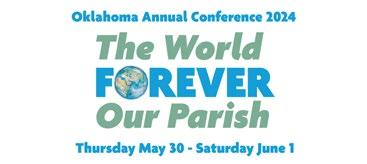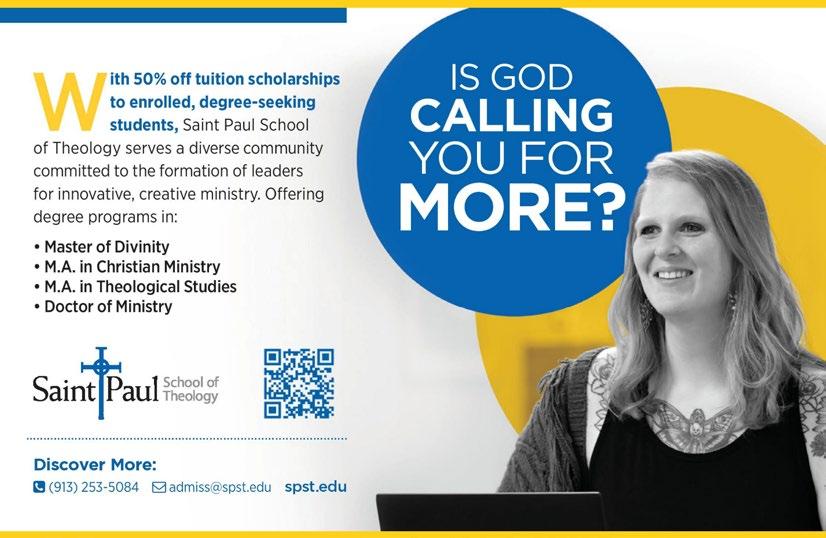














Since 2017, our conference has been using a Consent Calendar to expedite our business proceedings and allow us to focus on ministry reports and other celebrations. Except for items of business that seem to need more discussion or individual votes, most of our business is placed on this special docket and approved during the enabling motions of our conference’s opening session. However, there are other legislative items that need more time for holy conferencing and votes. At this year’s annual conference, there
are six of those items which we will explain in the next two articles. This article will focus on the three Board of Pension and Health Benefit reports as well as two resolutions that come from the Board of Church and Society. In next week’s article, we will examine the 2025 budget and the Council on Finance and Administration report.
The three pension reports are mostly unchanged from previous years but do require conference action.
Report 1 deals with our conference’s participation in the overall pension plan (Clergy
Retirement Security Program and the Clergy Protection Plan) and sets the past annuity rate for the pre-1982 pension plan. You will note in that report that we have fully funded the pre-1982 pension plan.
Report 2 concerns the active clergy health care program with plan details and the 2025 rates for insurance for all participants in the program. We are pleased to report that the Oklahoma Conference was only assessed a 1% increase in our HealthFlex premiums for 2025 and the Board of Pension and Health Benefits approved passing this increase on to the plan participants. Report 3 is commonly referred to as the Retired Clergy health care program or supplemental insurance.
This is a program that we approve year by year and that is important as it is a benefit that is available only upon the annual approval of conference members annually.
While this program is unchanged from the previous year, the funding mechanism for the program is changing. You will note in the 2025 apportioned budget that the line to fund this is zero. Rest assured, the program will be funded. However, after dialogue among the Annual Conference Council, the Council on Finance and Administration, and the Board of Pension and Health Benefits, the decision was made to fund this program from dollars received for such purposes from disaffiliated churches. In this way, we do not impact money available for programs and we do not do
any disservice to those who have faithfully served us and are now retired.
There are two resolutions coming before the conference session from our conference Board of Church and Society. They were presented before the March 1st deadline for resolutions to be received and were sent from the Annual Conference Council to the Consent Calendar Committee. They will be properly presented before the conference when we meet in May.
The first resolution is titled, “A Resolution Affirming LGBTQ+ Persons.” The second resolution is called “Calling the Church to Oppose Christian Nationalism.” I encourage you to read both resolutions carefully
before you come to conference in May. There are some other resources available at our annual conference information hub regarding these resolutions.
As a reminder of our rules of organization, there will be three speeches for and three speeches against each of these resolutions. I encourage you to review the parliamentary procedures in the first section of our Pre-Conference Workbook when it is published in the next few days.

 BY REV. TRISH HARRIS
BY REV. TRISH HARRIS
On Sunday, April 28, Nicoma Park UMC recognized Native American Sunday by hosting Melinda Waters-Miles as their guest speaker. Melinda has served as a past delegate from the Oklahoma Conference to Jurisdictional and General conferences. She shared about growing up as one of five children in a clergy family of the OIMC. Her father was the late Rev. Lindy Waters, Sr., who served as the Director of Interpretation and Promotion for
the OIMC conference at the time of his death. As a child, she put her trust in God and God has continued to be her guide and strength. She also shared about the Riverside Indian School, located just north of Anadarko, and the needs of students there.
Living in Oklahoma, we are more familiar with the Five Civilized Tribes and how many of the Native American children through their respective tribes are recipients of funds for school clothes and personal needs throughout the year. The amount they receive depends on their tribe’s education program. Nicoma Park gave to 26 girls in the fourth through seventh grade

dorm, who represented tribes from Arizona, Mississippi, Florida, South Dakota, and Oklahoma. Some come from reservations, and some come from local families throughout Oklahoma. Most do not receive any stipend and government funds are limited.
Jalen Tiger, the dorm parent, said, “I can’t wait to see their faces when they get in after school today. They are going to be so excited to see new hairbrushes, hair ties, scrunchies, toothbrushes, socks, all of this! Thank you so much. And tell your church, thank you so much!”
 Rev. Trish Harris and Jalen Tiger talk about the needs of the students as the desk is filled with items donated by members of Nicoma Park UMC. Submitted photos.
Rev. Trish Harris and Jalen Tiger talk about the needs of the students as the desk is filled with items donated by members of Nicoma Park UMC. Submitted photos.



General Conference is the top lawmaking assembly of The United Methodist Church and the only entity that speaks for the denomination. It convenes every four years, with delegates from the denomination’s regions around the world.
Regionalization Petitions
Approved
Delegates approved legislation that would restructure the denomination to be more contextual in different regions served by the church. Bishop Tracy S. Malone, president of the Council of Bishops, said that «Regionalization would enable the church to be contextual in ministry while remaining connected around the mission of the church and the essentials of the faith.» It would enable the church to “honor who we are as a worldwide denomination.”
Regionalization represents an effort to put the church’s different geographical regions on equal footing and to make the General Conference less U.S.-centric. The current central conferences and the U.S. would become regional conferences, with the same authority to pass legislation for greater missional impact.
Delegates also approved the continuation of work on a General Book of Discipline that would be
brought to the next regular session of General Conference.
The regionalization legislation involves an amendment to the church’s constitution. This would have to be approved by at least two-thirds of the total votes cast across all annual conferences worldwide in order for much of the regionalization legislation to take effect. If they receive the necessary number of votes, the results would be announced by the United Methodist Council of Bishops. The regionalization constitutional amendment is to be sent out 30 days after the adjournment of General Conference, which means some annual conferences could be voting on the amendment this year.
Regionalization stands as distinct from the other work of General Conference. It had been in development for many years, with the Standing Committee on Central Conference Matters and the Connectional Table collaborating on the petitions that were submitted. It received support from delegates from every region.
Learn more.
The General Conference voted by overwhelming majorities to remove from the United Methodist Book of Discipline discriminatory language and bans related to ministry by, with and for “self-avowed practicing” gay and lesbian people. Actions included:
Removal of the language that the “practice of homosexuality … is incompatible with Christian teaching.” Removal of the ban on the ordination and appointment of “selfavowed practicing homosexual” clergy.
Removal of language that made the ordination of “self-avowed practicing homosexual” clergy and the performance of same-sex weddings chargeable offenses.
Removal of mandatory minimum penalties for clergy holding same-sex weddings.
Removal of a prohibition against using United Methodist funds to support groups, activities and causes that promote the acceptance of homosexuality.
Removal of the requirement that the General Council on Finance and Administration, the denomination’s finance agency, enforce the funding ban. Instead, the provision says the agency should ensure that church funds do not go to anything that rejects LGBTQ persons or limits the response to the HIV epidemic.
Allowance for all clergy in good standing to be appointed across annual conference lines when their bishop can’t locate an appointment in their conference.
As they have traditionally done, conference bishops and their cabinets will consult with clergy and staffparish relations committees to find the best appointments for both the local church and the pastor.
These changes bring the Book of
Discipline back to a neutral place where one group is not singled out for discrimination. It holds space for differing opinions within The United Methodist Church by avoiding broad mandates.
Learn more.
Bishop Tracy S. Malone, resident bishop of the East Ohio Conference, became the first Black female president of the Council of Bishops on April 30, 2024.
Bishop David Wilson, resident bishop of the Great Plains Conference, became the first Native American bishop to preside over the General Conference on April 25, 2024.
Bishop Héctor A. Burgos Núñez became the first bishop from the island of Puerto Rico to preside over a plenary at a general conference on April 26, 2024.
Bishop Carlo Rapanut became the first Filipino-American bishop to preside over the General Conference on April 24, 2024.
Bishop Karen Oliveto became the first openly gay bishop to preside over the General Conference on May 3, 2024.
The Rev. Aleze M. Fulbright
became the first person of color to be elected secretary-designate of the General Conference on May 1, 2024.
Apportionment
Percentage
Decreased
In an effort to balance funding important connectional ministries through the general church budget and supporting the local church during financial challenges due to the pandemic and disaffiliation, delegates approved a compromise regarding apportionments. Conferences will shift from their current base rate of 3.29% to a base rate of 2.6% for 2025 and 2026. Then, if the apportionment collection rate is 90% or higher in those years, the base rate will increase to 2.9% for 2027 and 2028.
Learn more.

Delegates approved a 2025-2028 budget of $373.4 million. That total is contingent on collection rates being at 90% or more for the next two years. If giving is below that percentage, the budget bottom line will be $353.6 million. The total approved is significantly smaller than the budget approved by the

2016 General Conference. Annual conferences will be asked to pay less in apportionments.
Adoption of Revised Social Principles
Delegates approved the first overhaul of the denomination’s Social Principles in nearly 50 years. The Social Principles, contained in both the Book of Discipline and Book of Resolutions, are statements that reflect official United Methodist teachings on a wide range of topics. They are not church law but are intended to inform United Methodist witness on issues of the day with a biblical foundation. The 2012 General Conference approved revising the Social Principles, setting in motion a process that involved input from people around the world, coordinated by the General Board of Church and Society. In addition to the language changes regarding human sexuality and inclusiveness, the Social Principles address the importance of advocating for human dignity and combating racism and other threats, caring for creation and the environment, standing against social ills, and supporting healthy community in all its forms, including economic, social and political.
Disaffiliation Policy Ended, Reaffiliation Measure Approved
Delegates removed Paragraph 2553 from the Book of Discipline, ending the disaffiliation policy that was added by the special 2019 General Conference. They also required annual conferences affected by disaffiliation to develop grace-filled policies for reaffiliation of churches that want to rejoin the denomination.
Delegates also: approved a constitutional amendment addressing the denomination’s commitment to eradicating racism.
Approved an apology to victims and survivors of sexual misconduct by clergy and lay leaders in the church. The resolution also encourages the reporting of sexual abuse and states that the abuse of power will not be tolerated in the church. Delegates also observed Thursdays in Black in recognition of violence that is perpetrated against women around the world.
Approved an amendment to include «gender» and «ability» among the attributes that should not impede full participation in the life of the congregation.
Approved an apology for the role of Methodists in the overthrow of the kingdom of Hawaii in 1893.
Approved allowing deacons to preside at the sacraments “when contextually appropriate.” The new language further states: “Presiding at the celebration of the sacraments involves taking responsibility to lead the gathered community in celebrating baptism and Holy Communion.”
Approved updating jurisdictional young people’s ministries, including changing the Division on Ministries with Young People to the Young People’s Connectional Network.
Approved a new retirement plan for U.S. clergy, called Compass, which would be a defined contribution plan similar to what many corporate employers provide. The plan takes effect in 2026.
Approved a full communion agreement with the Episcopal Church. If the Episcopal Church affirms the agreement, it will mean the denominations recognize each other as the “one, holy, catholic and apostolic church in with the Gospel is rightly preached and taught.”
Approved adding two bishops for Africa, for a total of 15, and set the number of U.S. bishops at 32 – a decrease from the 39 active bishops and one retired bishop currently serving episcopal areas in the U.S.
Adopted a new Book of Resolutions, including readopting many resolutions and approving new ones, addressing topics such as climate change, rights of farm workers in the U.S., the observance of the Children’s Sabbath, caring for Native people and opposition to racial profiling.
Adopted a resolution condemning racial-ethnic discrimination and gender-based violence against Asian Americans.
Approved a resolution calling on United Methodist institutions not to invest in the government bonds of countries that have been cited by the U.N. Security Council or the International Criminal Court for prolonged military occupations.
Approved a motion to allow four Eurasian conferences to leave the denomination and form an autonomous church.
Celebrated the impact of Africa University and milestone anniversaries – the 200th anniversary of Methodist mission, the 100th anniversary of the United Methodist Building in Washington, D.C., and the 80th anniversary of the United Methodist Committee on Relief.
Elected a new Judicial Council, the denomination’s top court, and filled positions on the Commission on the General Conference, University Senate, general boards and agencies of the church and other entities, as well as trustees to John Street United Methodist Church in New York, the oldest continuously operating Methodist church in the United States.


Oklahoma delegates and alternates pose with Bishop Nunn during General Conference 2024.







Life at Epworth Villa is all about freedom. Freedom from home maintenance and chores. Freedom from having to drive all over town. Freedom from worrying about future needs. And when you’re free to live your best life, it’s amazing the joy that each day brings. Experience the freedom you deserve and check out our spacious cottages and beautiful apartments at EpworthVilla.org.
Donate to disaster relief. After tornadoes ravaged large swaths of Oklahoma, recovery will be ongoing. The link to donate is here.
Register for the Day of Learning on May 29, during Annual Conference. Register here.
Share your event or job opportunity in the Contact For consideration, email your listing to editor@okumc.org.